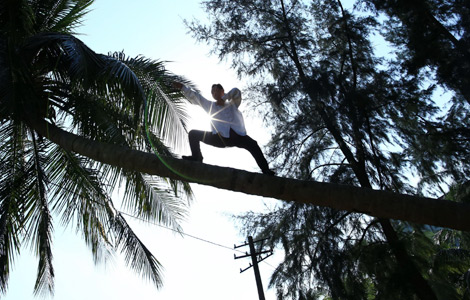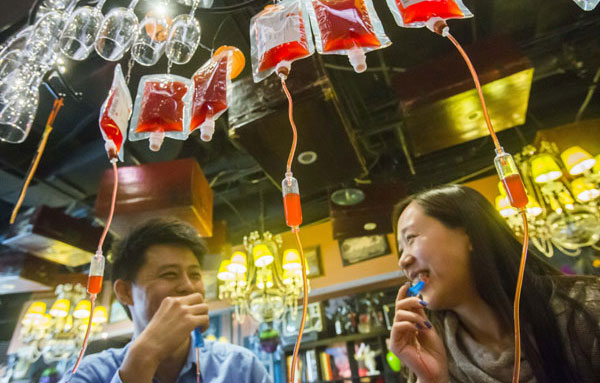Lifestyle changes behind breast cancer
Updated: 2013-10-31 07:20
By Wang Hongyi in Shanghai (China Daily)
|
||||||||
China launches young women's research project
China and other developing countries are experiencing a surge in breast cancer, according to a new study released by GE Healthcare this month, Breast Cancer Awareness Month.
Some of the rise can be attributed to increased life expectancy, but changing lifestyles, such as women having fewer children, are also a factor, it said.
 |
|
Cancer rehabilitation volunteers stand in a swimming pool full of 1 million balls at the Kerry Hotel in Pudong, Shanghai, on Wednesday. Lai Xinlin / for China Daily |
A 20 to 30 percent increase in breast cancer has been documented over recent decades in middle-aged women in China's urban areas, according to the report, although it said that this could be due in part to better diagnosis.
"We know from epidemiological studies that the risk of breast cancer is higher for women with no children," Bengt Jonsson, co-author of the report, said in an e-mail to China Daily.
"It also appears that having a child at a very young age (under 20) helps to protect against breast cancer. Having the first child over the age of 30 seems to be comparable to having no children."
Jonsson, a professor of health economics at the Stockholm School of Economics, said the findings could be linked to biological changes in the breast tissue such as early maturation of the tissue in relation to pregnancy, which could help guard against breast cancer.
Another finding is the relationship between breast-feeding and a lower risk of breast cancer, he said.
Breast cancer is the most common cancer among Chinese women. More than 160,000 breast cancer cases are detected each year and the incidence is rising at 3 to 4 percent annually.
According to the Shanghai Center for Disease Prevention, more than 4,000 out of about 25,000 new cancer cases among Shanghai women are breast cancer.
According to another health report, about 65 percent of women showed abnormal indicators in their breast checkups, such as cysts and lumps.
The results emerged after a review of about 260,000 adult female samples from the Ikang Guobin Healthcare Group, one of China's biggest healthcare companies.
Experts also said more younger women in China are getting breast cancer compared to those in other countries.
The disease is predominately found in the 40 to 45 age bracket, about 10 to 15 years earlier than in Western countries.
"In developing countries breast cancer usually presents itself at a younger age," Jonsson said. "There may be under-diagnosis of some groups of women in these societies, meaning that some old women with more indolent breast cancer may not reach medical attention and may not be registered."
He said another contributory factor can be that a Western lifestyle (diet, alcohol, obesity, for example) seems to increase the risk of breast cancer, albeit at a later stage and a lower aggressiveness. There may also be genetic factors influencing differences.
To provide better prevention and intervention, China's first health research project that evaluates risk factors among young women was launched this month.
The research program plans to compare three different groups of women under 40. The three categories are: healthy women, women with benign breast disease and women with breast cancer diagnosed within two years. It is hoped that the findings will provide clues to how to prevent and treat the disease.
"Although the incidence of breast cancer keeps rising, we found that the incidence among young women is not growing significantly," said surgeon Liu Guangyu at Shanghai Tumor Hospital affiliated to Fudan University, which is leading the research.
"On the other hand, incidences among middle-aged and older women are growing fast, which can infer that the incidence of breast cancer is less connected to environmental change, and we hypothesize that it might be genetic susceptibility or other factors," he said. "This study is expected to provide a more precise direction for young women to escape the disease."
The country's first smartphone application for breast cancer education was also launched along with the research.
By downloading the app, women can learn about breast cancer and how to check themselves.
Measures can be taken to reduce the risk, and early detection can help beat the disease.
Dr Yang Ziang at Zhongshan Hospital said establishing a healthy lifestyle and having regular medical checkups is important, as is diet.
Reducing the intake of high-fat and high-calorie food, exercising and refraining from smoking and drinking excessively also reduce the risk of cancer.
wanghongyi@chinadaily.com.cn

 Kung fu master becomes hit online
Kung fu master becomes hit online
 Color-blind love
Color-blind love
 Lenovo's new secret weapon: Hollywood star
Lenovo's new secret weapon: Hollywood star
 Brussels visit heralds closer trade ties for EU and China
Brussels visit heralds closer trade ties for EU and China
 Halloween gaining popularity but still sees cultural differences
Halloween gaining popularity but still sees cultural differences
 US embassy accused as 'spy hub'
US embassy accused as 'spy hub'
 Halloween beverage offers vampire experience
Halloween beverage offers vampire experience
 Lenovo launches new Yoga tablet
Lenovo launches new Yoga tablet
Most Viewed
Editor's Picks

|

|

|

|

|

|
Today's Top News
US business asks easing of market barriers
Benefit held for NYC official's ex-campaign treasurer
HIV epidemic needs education, not bath house bans
Tian'anmen jeep crash a terror attack
US spied on Chinese cities: report
Legislation to help reduce pollution
Survey examines education gap
Govt pledges more housing
US Weekly

|

|






